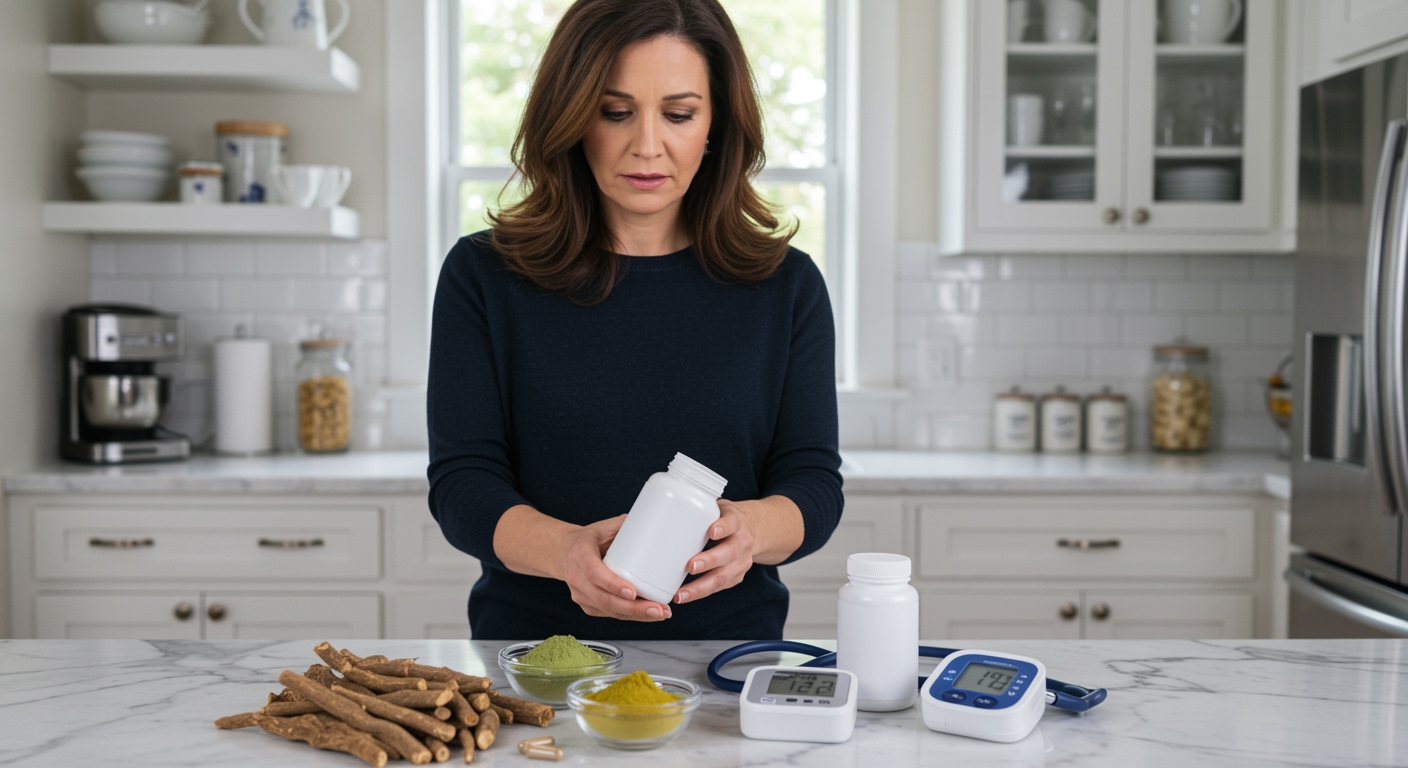✪ Key Takeaway: Ashwagandha can dangerously lower blood pressure and should be avoided by people with hypotension.
Introduction
Your friend swears by ashwagandha for stress relief, but you have low blood pressure and wonder if this popular herb is safe for you.
You might be asking this question because you have hypotension and want to try natural remedies without making your condition worse.
Hi, I’m Abdur, your nutrition coach and today I’m going to explain why ashwagandha can be risky for people with low blood pressure and what you should know before considering this supplement.
How Does Ashwagandha Affect Blood Pressure?
Ashwagandha works by reducing cortisol levels in your body, which is your primary stress hormone.
When cortisol drops, your blood vessels naturally relax and widen, causing blood pressure to decrease.
This mechanism happens because cortisol normally keeps your blood vessels slightly constricted to maintain adequate blood pressure.
Research shows that ashwagandha can lower both systolic and diastolic blood pressure readings in healthy adults.
The herb also affects your nervous system by promoting relaxation, which further contributes to blood pressure reduction.
For people with normal or high blood pressure, this effect can be beneficial and therapeutic.
✪ Fact: Ashwagandha can lower blood pressure by up to 5-10 mmHg in some individuals within just 8 weeks.
What Happens When You Have Low Blood Pressure?
Low blood pressure, or hypotension, means your blood pressure readings are consistently below 90/60 mmHg.
Your body already struggles to pump blood effectively to your vital organs when you have this condition.
Common symptoms include dizziness, fatigue, blurred vision, and fainting spells that can be dangerous.
Your brain, heart, and kidneys need adequate blood flow to function properly, and low pressure compromises this delivery system.
When blood pressure drops too low, you might experience orthostatic hypotension, which causes dizziness when standing up quickly.
Some people with hypotension also report cold hands and feet because blood circulation becomes less efficient.
The condition can be temporary due to dehydration or medication, or it can be a chronic health issue requiring medical management.
✪ Note: Blood pressure below 90/60 mmHg is considered low and may require medical attention if symptoms occur.
Why Is Ashwagandha Risky for Hypotension?
Taking ashwagandha when you already have low blood pressure can create a dangerous double effect.
The herb will further lower your already compromised blood pressure, potentially causing severe symptoms or medical emergencies.
You might experience extreme dizziness, fainting, or even loss of consciousness if your pressure drops too low.
Your heart might start beating faster to compensate for the low pressure, creating additional cardiovascular stress.
The risk becomes especially high if you take ashwagandha with blood pressure medications or other hypotensive substances.
Some people report feeling weak, confused, or experiencing rapid heartbeat when ashwagandha drops their pressure too much.
The timing of these effects can be unpredictable, making it difficult to anticipate when symptoms might occur throughout your day.
✪ Pro Tip: Monitor your blood pressure daily if you decide to try ashwagandha despite having hypotension.
What Are Safer Alternatives for Stress Relief?
If you have low blood pressure but need stress management, several safer alternatives exist that won’t affect your cardiovascular system.
Regular exercise like walking or gentle yoga can help manage stress while actually improving circulation and blood pressure regulation.
Deep breathing exercises and meditation provide immediate stress relief without any blood pressure effects.
Magnesium supplements can help with stress and anxiety while supporting healthy muscle and nerve function.
B-complex vitamins support your nervous system during stressful periods without affecting cardiovascular function.
Adequate sleep, proper hydration, and regular meals help your body manage stress naturally and safely.
Consider working with a healthcare provider to develop a comprehensive stress management plan that accounts for your low blood pressure condition.
✪ Fact: Regular moderate exercise can naturally boost low blood pressure while reducing stress hormones safely.
When Should You Consult a Doctor?
Always consult your healthcare provider before taking ashwagandha if you have diagnosed hypotension or blood pressure concerns.
Your doctor needs to evaluate your specific condition, current medications, and overall health status before approving any new supplements.
If you experience symptoms like frequent dizziness, fainting, or extreme fatigue, seek medical attention immediately.
Blood pressure medications, heart conditions, or other health issues can create dangerous interactions with ashwagandha.
Your healthcare provider can recommend safer alternatives for stress management that won’t compromise your cardiovascular health.
Regular monitoring becomes essential if your doctor approves ashwagandha use despite your low blood pressure condition.
Never stop prescribed blood pressure medications to try ashwagandha without proper medical supervision and guidance.
✪ Note: Emergency medical care is needed if ashwagandha causes severe dizziness, fainting, or chest pain.
The Bottom Line
Ashwagandha is not safe for people with low blood pressure because it can dangerously lower already compromised cardiovascular function.
Your health is worth more than any trending supplement, and safer alternatives exist for managing stress without cardiovascular risks.
I would love to hear about your experience with low blood pressure management or any questions you might have about safe supplement choices in the comment section below.
References
At NutritionCrown, we use quality and credible sources to ensure our content is accurate and trustworthy. Below are the sources referenced in creating this article:
- Consensus: Ashwagandha and Blood Pressure
- PMC: Ashwagandha Research Study
- Healthline: Ashwagandha Benefits and Risks
- NIH: Ashwagandha Fact Sheet





